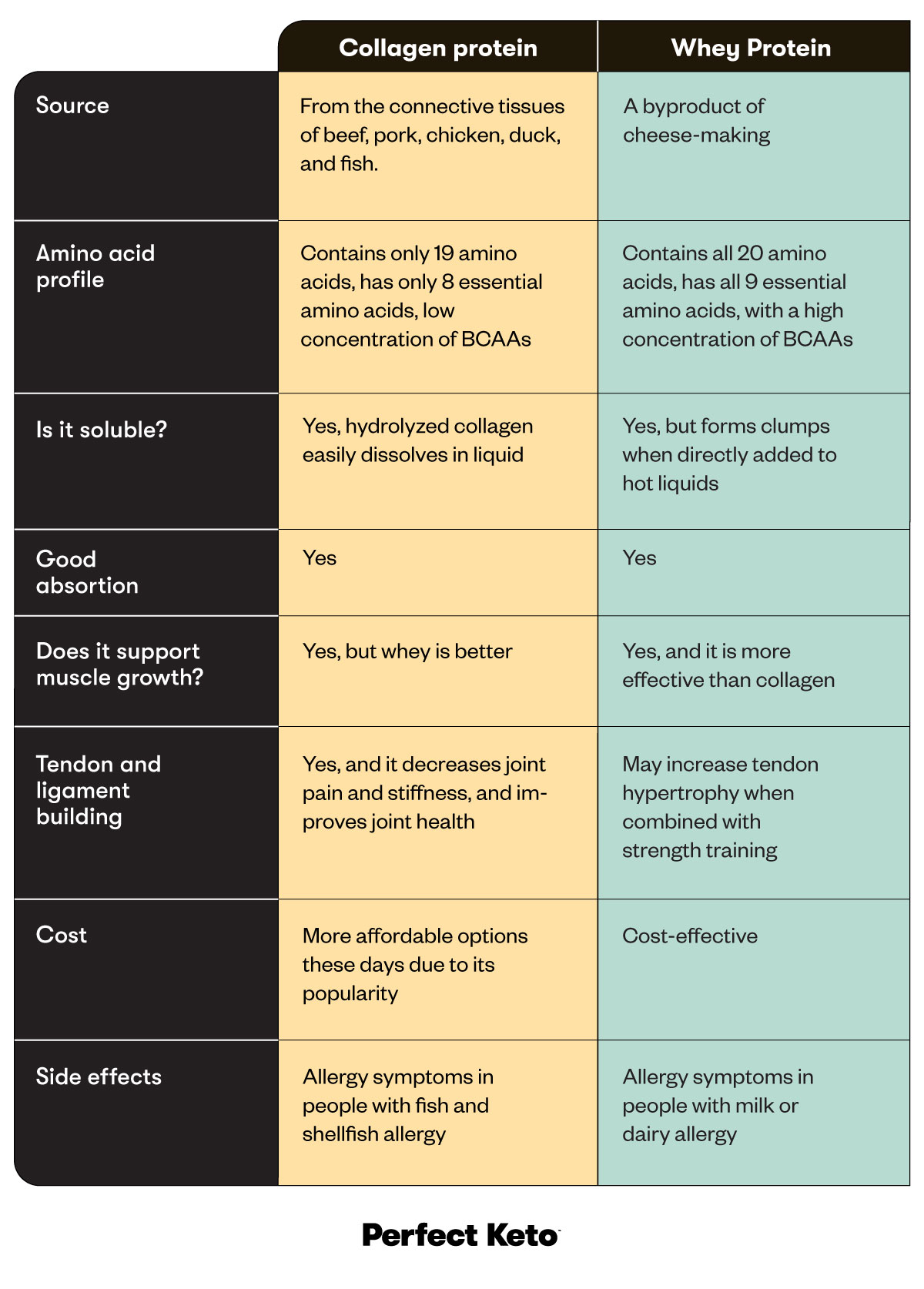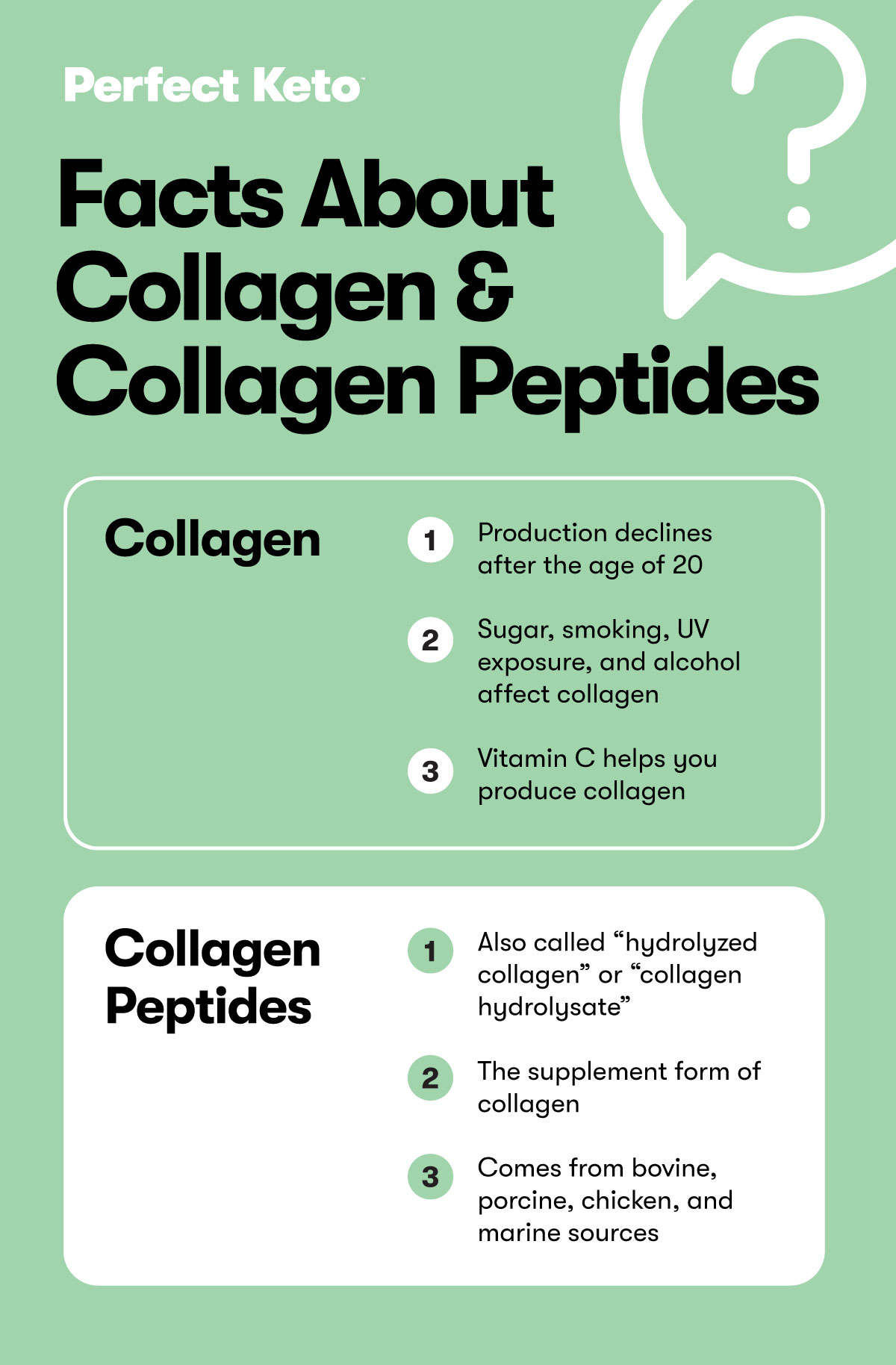When choosing between Collagen Peptides vs. Collagen Protein, consider the difference in absorption and ease of digestion. Collagen peptides are hydrolyzed, making them more accessible for the body to digest and absorb compared to regular collagen protein.
Collagen peptides are considered the best form of collagen for ingestion and are beneficial for muscle building, injury recovery, and bone density improvement. Due to their superior bioavailability and health benefits, collagen peptides have become increasingly popular. On the other hand, regular collagen protein may be more complex for the body to digest and absorb.
The comparison involves factors such as absorption, muscle-building capacity, injury recovery, and bone density enhancement. Consequently, understanding the differences between collagen peptides and collagen protein is crucial for making an informed choice for your dietary and health needs.

Credit: perfectketo.com
Collagen Vs. Whey Protein
Considering Collagen vs. Whey Protein, it’s essential to understand the differences in their structure, source, absorption rates, and effectiveness in muscle building.
Structural And Source Differences
- Collagen: Structural protein found in skin, bones, and connective tissues of animals.
- Whey Protein: A complete protein derived from milk during cheese production.
Comparison In Absorption Rates
- Collagen: It may have slower absorption due to its complex structure.
- Whey Protein: Generally fast-absorbing, leading to quick amino acid availability.
Effectiveness In Muscle Building
- Collagen supports connective tissues but may not be as effective for muscle building due to differences in its amino acid profile.
- Whey Protein: Known for promoting muscle protein synthesis and growth due to its rich amino acid content.

Credit: naturalforce.com
Collagen Peptides Vs. Collagen Protein
Are you confused about the difference between Collagen Peptides and Collagen Protein? This article will provide a comprehensive comparison to help you understand each’s distinctive characteristics and benefits.
Understanding Collagen Peptides
Collagen peptides, also known as hydrolyzed collagen, are composed of small bioactive peptides that are easily absorbed and assimilated by the body. These peptides are derived from collagen protein through a process called hydrolyzation, which breaks down the larger collagen molecules into smaller, more digestible peptides.
Benefits Of Hydrolyzed Collagen
Hydrolyzed collagen offers a myriad of benefits, including improved skin elasticity, joint health, and muscle recovery. Due to its bioavailability, collagen peptides are readily absorbed by the body, making them a popular choice for individuals seeking to support their overall well-being.
Comparison In Digestibility And Bioavailability
When comparing collagen peptides to collagen proteins, the primary distinction lies in their digestibility and bioavailability. Owing to their hydrolyzed nature, collagen peptides are easier for the body to digest and absorb than collagen protein. This enhanced bioavailability makes collagen peptides an ideal choice for individuals looking to reap the benefits of collagen supplementation efficiently.
Type I Collagen
When it comes to collagen supplementation, one crucial factor to consider is the type of collagen being used. Type I collagen is the most abundant type of collagen found in our bodies. It is primarily found in our skin, tendons, bones, and ligaments. Type I collagen plays a crucial role in maintaining the structure and strength of these tissues.
The Most Effective Form Of Collagen
Collagen peptides are generally considered the best form of collagen for ingestion purposes. They are obtained by hydrolyzing collagen, which breaks it down into small peptides. This process makes collagen peptides easier for the body to digest and absorb, leading to better bioavailability and effectiveness.
On the other hand, collagen protein refers to collagen in its whole form, without the breakdown into smaller peptides. While collagen protein can still provide some benefits, its larger molecular structure may make it less readily absorbed and utilized by the body compared to collagen peptides.
Side Effects And Considerations
The side effects of collagen supplements, whether in the form of peptides or protein, are generally mild and not significant. Some individuals may experience mild digestive symptoms or a bad taste in their mouth after taking collagen supplements. However, the occurrence of these side effects can vary depending on an individual’s overall health and specific circumstances.
It’s also important to note that collagen, whether in peptides or protein form, should not be considered a complete source of protein. Collagen has a different amino acid profile compared to traditional animal or plant-based protein powders. While collagen does contain some amino acids, it may not provide the same comprehensive benefits for muscle building and protein synthesis as traditional protein sources.
In conclusion, collagen peptides are generally considered the most effective form of collagen for ingestion. They offer better digestibility and absorption compared to collagen protein. However, if you are considering collagen supplementation, it’s always recommended to consult with a healthcare professional to determine which form and dosage are appropriate for your individual needs.
Collagen As Protein
Collagen peptides and collagen proteins differ in their amino acid content. Collagen peptides are broken down into smaller peptides, making them more accessible for the body to digest. While collagen is a complete protein, collagen peptides are fragments of that protein, providing different benefits for the body.
Collagen as Protein Heading Amino Acid Content Comparison
Amino Acid Content Comparison
Collagen has a distinct set of amino acids compared to typical protein powders. While collagen contains glycine, proline, hydroxyproline, and arginine, it lacks tryptophan, cysteine, and methionine, which are essential for protein synthesis.
Distinguishing Collagen’s Role
Distinguishing Collagen’s Role
Collagen, known for its role in supporting skin, joints, and connective tissues, provides specific amino acids that contribute to collagen synthesis and elastin formation.
Collagen Vs. Collagen Peptides
When it comes to collagen supplementation, understanding the difference between collagen and collagen peptides is crucial for optimal health benefits.
Different Protein Forms
Collagen is the main structural protein found in the body, providing strength and elasticity to various tissues. Collagen peptides, on the other hand, are short chains of amino acids derived from collagen proteins.
Digestibility Of Collagen Peptides
Collagen peptides, also known as hydrolyzed collagen, are broken down into smaller peptides during processing, making them highly digestible. This improved digestibility allows for better absorption and utilization by the body.

Credit: perfectketo.com
Choosing Between Collagen And Collagen Peptides
Understanding the key differences between collagen and collagen peptides is essential for making an informed decision.
Benefits Of Collagen Peptides
Collagen Peptides offer enhanced benefits for skin, joints, and gut health due to their bioavailability and faster absorption rate.
Accessibility And Absorption Rate
Collagen Peptides are more accessible to the body as they are broken down into smaller peptides, allowing for easier absorption compared to regular Collagen proteins.
Frequently Asked Questions
Which Is Better, Collagen Peptides Or Collagen Protein?
Collagen peptides are considered the best form of collagen for ingestion. They are accessible for the body to digest as they have been broken down into small peptides. Collagen protein, on the other hand, is the complete protein form of collagen and is more difficult for the body to absorb.
Which Form Of Collagen Is Most Effective?
Collagen peptides are the most effective form of collagen for ingestion. They are broken down into small peptides, making digestion easier.
Is There A Downside To Taking Collagen Peptides?
Collagen peptides may cause mild digestive symptoms or a bad taste, but any other side effects depend on overall health.
Do Collagen Peptides Work As Protein?
Collagen peptides are not the same as proteins due to their different amino acid content. While collagen is a complete protein, peptides are smaller fragments.
Conclusion
Choosing between collagen peptides and collagen protein depends on your specific health goals. Collagen peptides are easily absorbed and can support overall health, while collagen protein provides a complete protein but may be harder to digest. Understanding the differences can help you make a more informed choice for your individual needs.



